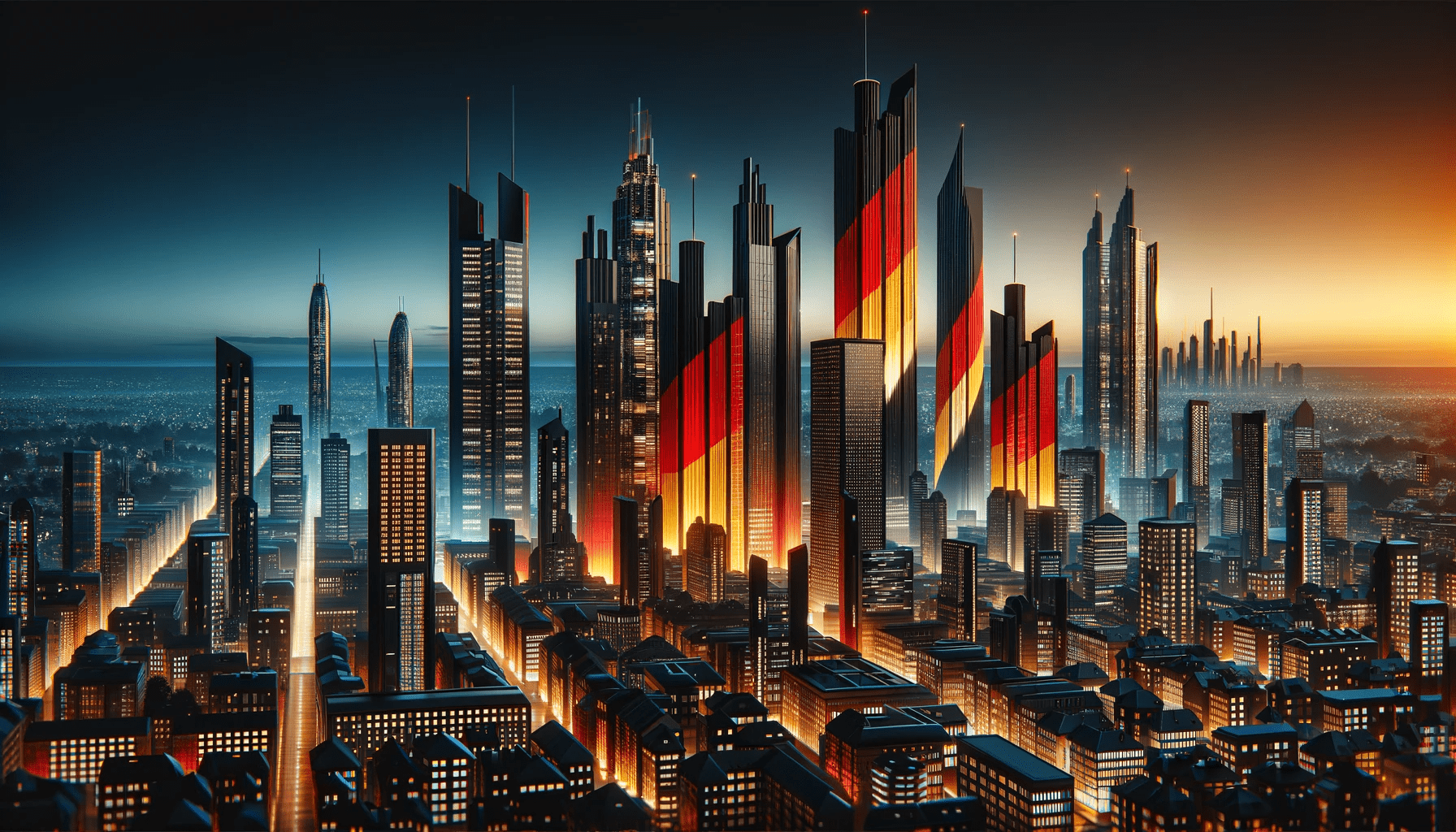Key Takeaways about Germany from Global Startup Ecosystem Report 2023
Written by
Kinga EdwardsPublished on

StartupBlink’s Global Startup Ecosystem Index ranks startup ecosystems of 1000 cities and 100 countries each year since 2017. Let’s learn the most critical insights from this report below, or download it here.
Don’t wait and open doors to a thriving German landscape with immense potential for success.
The current state of the global startup ecosystem
In 2021, a startup valuation bubble emerged, but it is now undergoing a significant correction, with many publicly traded startups plummeting in value, some by as much as 90%. The bubble resulted from government subsidies, low interest rates, and free money aimed at countering COVID-19’s impact. However, inflation and rising interest rates have increased risk in the startup sector.
Source: Global Startup Ecosystem Report 2023
Startups are now prioritizing profitability over growth at any cost, and funding is becoming scarcer. This leads some founders to bootstrap their ventures. As long as interest rates remain high, more startups are expected to face financial difficulties. Thus, this could potentially usher in a period of limited funding.
In 2022, global startup funding declined by over 30% and affected particularly late-stage investments. Early-stage funding showed resilience, but the first quarter of 2023 witnessed a 53% decrease, mainly due to massive investments in OpenAI and Stripe in Q1 2022.
Source: Global Startup Ecosystem Report 2023
The Silicon Valley Bank’s collapse added to startups’ challenges, though the US government guaranteed deposits to mitigate its global impact. Unicorns (startups valued over $1 billion) continue to be created, but their growth has slowed. Many may lose their unicorn status due to lower worth, according to business valuation services.
Moreover, layoffs have increased in the IT and startup sectors. They deflated the sector’s prominence, and global tech giants led the workforce reduction trend.
Source: Global Startup Ecosystem Report 2023
The Software & Data sector remains the dominant industry in 2023, representing approximately 31.95% of all startups. Healthech and Fintech follow closely behind, constituting 12.83% and 10.43% of startups, respectively. Interestingly, there has been a slight decline in startup interest in the Ecommerce & Retail and Social & Leisure sectors compared to the previous year, with the percentage of startups in Ecommerce & Retail decreasing from 9.76% to 9.47%, and the percentage in Social & Leisure dropping from 10.38% to 9.74%.
Source: Global Startup Ecosystem Report 2023
Startup industry trends
In the startup industry, certain trends and shifts have come to the forefront. Let’s check them:
- The rise of AI. Artificial intelligence has witnessed remarkable growth, with AI applications such as ChatGPT, Midjourney, and Lensa. Companies and governments are increasingly adopting AI solutions, with significant investments, like Microsoft’s $10 billion in OpenAI. However, concerns about regulatory hurdles, like the EU’s Artificial Intelligence Act, loom, and prompt discussions on responsible innovation.
- Reduced interest and breakdowns in Web 3.0. Despite initial excitement about blockchain and Web3 technologies, this sector experienced a notable decline in funding. Several factors, like the collapse of banks supporting crypto and cryptocurrency exchange failures, contributed to a challenging year for Web3. Therefore, rebuilding trust and focusing on practical applications is key to its potential resurgence.
Source: Global Startup Ecosystem Report 2023
- Decline in popularity of metaverse and VR. While the Metaverse and VR held promise, the industry struggled to integrate these technologies into the mainstream economy. Meta’s shift away from Metaverse projects underscores this challenge, and venture investments in VR and AR declined in 2022.
Source: Global Startup Ecosystem Report 2023
- The rapid growth of climate tech. Climate tech attracted significant investment – it accounted for over a quarter of venture capital investments in 2022. Despite some negative trends, governments direct substantial resources towards zero emissions initiatives and drive growth in this sector.
- Growth in the semiconductor market. Geopolitical shifts and increased risks have boosted the semiconductor industry’s importance, with projections of reaching $1 trillion in revenue by 2030. Countries like the US, Taiwan, China, and the EU are heavily investing in semiconductor production and recognize its strategic significance.
Global Startup Ecosystem Index: Germany
Now, let’s get down to business and see the top countries and cities’ ecosystems for startups.
Germany is in 7th place in the ranking of the best countries (out of 100) – Thus, they have 3rd place in Europe, after the United Kingdom and Sweden. What’s more, Berlin is in 11th place for best cities (out of 1,000).
The top countries include:
Source: Global Startup Ecosystem Report 2023
And the top cities include:
Source: Global Startup Ecosystem Report 2023
Europe overview
There are notable shifts in rankings and regional representation in the European startup landscape.
➡️ Iceland has displayed remarkable progress – it climbed 9 spots to reach 32nd place globally,
➡️ Luxembourg and Liechtenstein also improved their positions.
➡️ Conversely, Slovakia and Belarus have experienced declines in their rankings.
➡️ The UK, particularly London, remains the strongest European presence, with a significant lead over the rest of the continent.
➡️ Germany, Sweden, France, and the Netherlands remain in the regional top 5.
European cities are categorized into four tiers, with London forming the first tier, followed by Paris and Berlin in the second tier. Moscow represents Eastern Europe in the rankings, while cities like Istanbul and Lisbon show impressive growth. Conversely, Barcelona, Dublin, and Copenhagen have seen negative momentum.
Notably, Germany and Spain are the only countries with two cities in the regional top 10, indicating a decentralized startup scene in these nations compared to others in Europe.
Source: Global Startup Ecosystem Report 2023
Region overview
The Berlin Startup Ecosystem is one of the leading European hubs and has ranked in the top 15 globally since the first publication of the Global Startup Ecosystem Index. As Germany’s leading ecosystem Berlin proudly presents itself as a city of impact startups, a city of talents, a city of enablement, a city of diversity, and a city of cooperation. Come and join our movement to use the problem-solving capacity of startups to build a sustainable future for our city, our country, and possibly the whole society.
Franziska Giffey
Berlin Senator for Economics, Energy, and Public Enterprises
Germany maintains a strong presence in the global startup landscape – it ranked 7th globally and has a positive momentum. The country boasts 17 diverse ecosystems in the global top 300. It’s the 2nd highest-ranked in the EU and 3rd in Europe overall.
Berlin and Munich stand out as powerful startup hubs, with Berlin edging closer to the global top 10 and Munich approaching the top 30. Germany also excels at the city level, with eight cities in the EU top 50.
It’s more than any other EU Member State.
Source: Global Startup Ecosystem Report 2023
Germany’s startup scene is characterized by diversity and a decentralized structure, with Berlin and Munich serving as focal points.
Berlin, now 11th globally, is the 2nd ranked city in the EU, while Munich saw significant growth and jumped 5 spots to 34th globally. Germany is the only country with two cities in the EU top 5. However, Hamburg faced a 15-spot decrease and ranked 90th.
In terms of industries, Berlin ranks highly across various sectors, with Fintech, where it stands out at 7th globally. Munich excels in Transportation, ranking 10th worldwide. Other cities like Hamburg and Stuttgart also make notable industry contributions.
The federal structure of the country fosters non-centric ecosystems. Moreover, corporate giants like SAP, Siemens, and Bosch contribute to the national startup ecosystem through open innovation initiatives.
The public sector in Germany supports startups through various incentives. It promises a pledge of €30 billion allocated to the startup sector by 2030. However, there are challenges related to bureaucracy and labor costs that need to be addressed to boost the growth of German startup ecosystems further.
Despite these challenges, Germany’s skilled workforce and EU leadership position continue to attract entrepreneurial attention.
Over to You
As you can see, Germany and its cities, including Berlin, Munich, and Hamburg, are great places to run startups. The country’s diverse ecosystem, coupled with access to a large local and European market, creates a fertile ground for innovation and growth. Berlin and Munich, in particular, offer vibrant hubs for various industries.
So, if you were wondering whether Germany is a good place to build a startup, we hope we’ve just cleared up your doubts.
Sign in to our newsletter and stay updated with the latest news.


